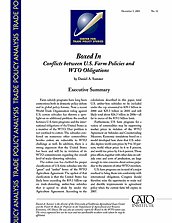The cotton case has clarified the proper classification of U.S. farm subsidies into the “green” and “amber” boxes of the WTO Agriculture Agreement. The upshot of that clarification is that the United States has likely been exceeding the $19.1 billion cap on trade-distorting, amber-box subsidies that it agreed to abide by under the Agriculture Agreement. According to the calculations described in this paper, total U.S. amber-box subsidies to be included under the cap amounted to $29.1 billion in 2000 and $25.3 billion in 2001 and will likely total about $26.3 billion in 2006–all far in excess of the $19.1 billion limit.
Furthermore, U.S. farm programs for a variety of commodities may be suppressing market prices in violation of the WTO Agreement on Subsidies and Countervailing Measures. Economic simulations based on a model developed here show that U.S. subsidies depress world corn prices by 9 to 10 percent, world wheat prices by 6 to 8 percent, and world rice prices by 4 to 6 percent. Those price effects, together with other data on subsidy rates and costs of production, are large enough to raise concerns about serious prejudice to the interests of other WTO members.
U.S. farm programs are in need of a major overhaul to bring them into conformity with international obligations. Congress should therefore seize the opportunity to make real and durable improvements in agricultural policy when the current farm bill expires in 2007.


